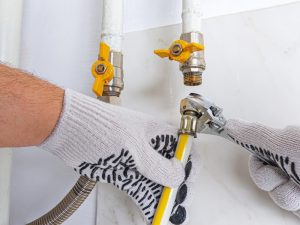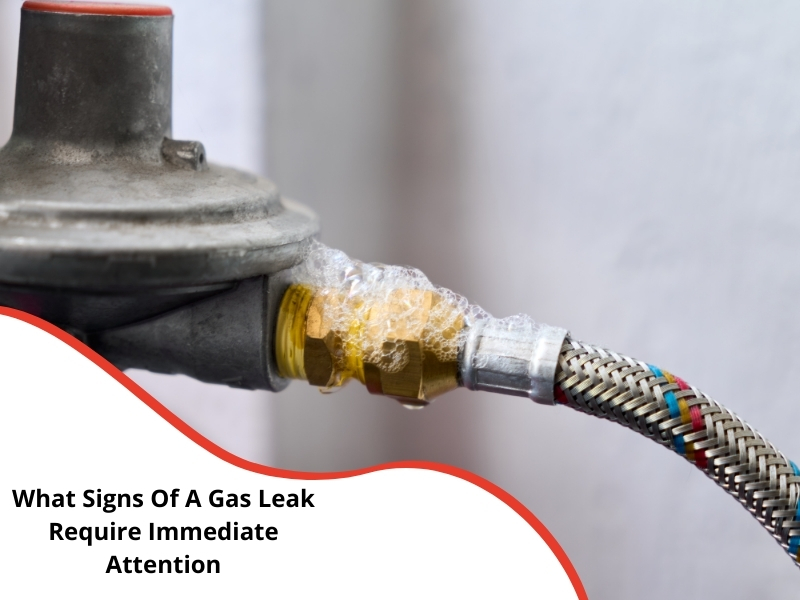Gas leaks are a serious safety concern that can lead to dangerous consequences. They can happen at any time, and it’s crucial to know how to identify the warning signs of a gas leak in your home or business. Being aware of these signs can help you act quickly, reducing the risk of harm to yourself, your family, or your employees. This article will walk you through the key signs that a gas leak requires immediate attention and the steps to take in case of a leak.
How can you recognise the smell of gas?
One of the most common signs of a gas leak is the distinct smell of gas. Natural gas is odourless, but a harmless chemical called mercaptan is added to it, which gives it a strong, sulphur-like odour, often compared to rotten eggs. If you notice this smell in your home or business, it’s a clear indicator that there might be a gas leak. Here’s how you can recognise the smell:
- A strong, rotten egg-like smell: This is the most noticeable sign.
- Faint or strong smell: Gas leaks vary in strength. If the smell is faint, it might indicate a small leak; if it’s overpowering, it could be a larger leak.
- Unusual smell in specific areas: If the odour seems to be more concentrated around gas appliances or gas lines, it’s a good sign the leak is nearby.
Are there any sounds that signal a gas leak?
- Hissing or whistling noise: A hissing sound near gas lines or appliances could signal a leak.
- Bubbling noise: If you hear bubbling near gas appliances or in water (e.g., near a gas water heater), it might be a sign of a leak in the water heating system.
- Unusual appliance noise: If you hear an unusual sound coming from your gas heater or stove, it could indicate a malfunction or gas leak.
How can physical symptoms indicate a gas leak in your home?
Exposure to gas leaks can affect your health. If you or anyone in your household experiences any physical symptoms, it may be a sign of a gas leak. Here are some common symptoms of gas exposure:
- Headaches or dizziness: A lack of oxygen due to a gas leak can cause these symptoms.
- Nausea and vomiting: Breathing in gas can lead to digestive issues, making you feel sick.
- Shortness of breath or difficulty breathing: If there’s a leak, you might struggle to breathe normally due to the lack of oxygen in the air.
- Fatigue or confusion: Continuous exposure to gas can lead to feeling unusually tired or confused.

Is there any visible damage to gas pipes or appliances?
If you see visible damage to your gas pipes or appliances, it could indicate a gas leak or an imminent risk of one. Here’s what to look out for:
- Cracks or holes in gas pipes: If you notice any cracks, holes, or dents in the gas pipes, gas might be escaping.
- Damage to gas appliances: Look for signs of wear, rust, or damage to appliances like gas stoves, heaters, or water heaters.
- Loose connections or fittings: Check if any of the gas appliance connections are loose or not sealed properly.
Understanding the causes of gas pipe corrosion can help prevent these issues, as factors like moisture, age, and exposure to harsh conditions can accelerate deterioration.
What should you do if you suspect a gas leak?
If you suspect a gas leak in your home or business, it’s essential to act quickly and safely. Here are the steps you should take:
- Do not use any electrical switches or open flames: Avoid turning on or off lights, using your phone, or lighting any matches. Sparks can trigger an explosion.
- Ventilate the area: Open windows and doors to allow fresh air to circulate and disperse the gas.
- Evacuate the area immediately: Leave the building and make sure everyone else does, too. Do not delay leaving.
- Contact emergency services: Once you’re safely outside, call emergency services or your gas company. They can advise you on the next steps and send a professional to inspect the situation.
- Do not re-enter until cleared: Do not go back inside until a professional has inspected the property and confirmed it’s safe.
Remember, the environmental impact of natural gas can be significant, and addressing potential leaks promptly ensures both safety and sustainability.
How can you prevent gas leaks in the future?
Prevention is always better than cure. While gas leaks can sometimes be unavoidable, regular maintenance and caution can reduce the risk, as gas devices can be risky if not properly maintained. Here are a few steps to prevent future gas leaks:
- Schedule regular inspections: Have a licensed professional inspect your gas lines and appliances regularly. This can help detect issues before they become dangerous.
- Maintain gas appliances: Ensure that your gas appliances, such as heaters, stoves, and water heaters, are well-maintained and in good working condition.
- Replace damaged pipes or fittings: Replace any worn or damaged gas pipes or appliance connections immediately.
- Install carbon monoxide detectors: These devices can alert you to dangerous levels of carbon monoxide, which may result from incomplete combustion caused by a gas leak.
- Take responsibility for gas line maintenance: Regular gas line maintenance responsibilities are crucial for the safety of your home or business.

Why is professional gas plumbing essential?
When it comes to gas plumbing, professional expertise is crucial to ensure safety and efficiency. Gas systems are complex and require a skilled hand to install, maintain, and repair. Here’s why hiring a professional gas plumber is essential:
- Expertise and knowledge: Licensed gas plumbers have the experience and training to handle gas systems safely. They can identify and resolve issues quickly to prevent accidents.
- Compliance with regulations: Gas plumbing work must meet strict local regulations for safety. A professional ensures that your installation, repair, and maintenance are all compliant with Sydney’s standards.
- Quality work: Professionals use the right materials and follow industry best practices to ensure that your gas system functions optimally, reducing the likelihood of future issues.
- Safety first: Gas systems can be hazardous. A professional plumber will ensure that your gas appliances and plumbing are safe, reducing the risk of leaks, explosions, or carbon monoxide poisoning.
Hiring a professional ensures you receive expert gas plumbing solutions, which are crucial for the safe installation, maintenance, and repair of gas systems in your home or business.
Don’t let a gas leak put your family at risk
If you suspect a gas leak in your home or business, don’t delay in seeking professional help. Apex Gas Heater Service is your trusted partner for gas leak detection, gas plumbing, and gas heater repairs across Sydney. Our expert team is ready to respond to your call and provide quick, reliable, and safe solutions. Don’t take chances with gas leaks—contact Apex Gas Heater Service today for expert advice!

